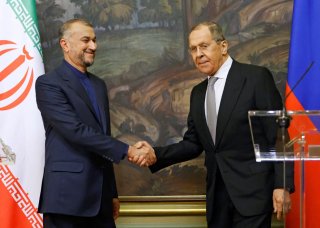The Real Threat From Russia’s New Nuclear Demands in Vienna
Moscow has the most to gain from Tehran’s new demands surrounding the final stages of the revived nuclear agreement.
The ongoing Vienna negotiations aimed at restoring the 2015 joint U.S.-Iranian nuclear arrangement hit a new roadblock this month. Despite Russia’s full-scale invasion and violent occupation of Ukraine, the country was permitted to remain part of the talks by the Biden team since reviving the nuclear arrangement is considered a top priority for the White House. Unsurprisingly, Moscow is exploiting America’s eagerness to finalize a deal by leveraging Iran for relief from the economic sanctions imposed on Putin’s Ukraine invasion.
In March, Russian foreign minister Sergei Lavrov requested written guarantees that Moscow would be able to circumvent targeted sanctions that would allow it to trade freely and broadly with Tehran. Lavrov specifically called for the persistence of “economic and investment cooperation and military-technical cooperation” with Iran. The Moscow-Tehran strategic partnership has progressed over the last year, culminating in the joint desire to form a military, intelligence, and economic alliance as a counter to the West.
In response to Moscow’s additional requests, U.S. secretary of state Antony Blinken told CBS that Western sanctions imposed on Russia “are not in any way linked together” with the Iranian nuclear deal. However, Moscow has played a critical role in helping Tehran evade U.S. sanctions on crude oil and there is no doubt the relationship will be reciprocal. In a recent article for the Washington Free Beacon, reporter Adam Kredo uncovered that two Russian tankers recently sanctioned amidst the Ukraine invasion were illicitly carrying Iranian oil. This activity highlights the strengthening relationship between the two U.S. adversaries in addition to Russia and Iran’s ability to work together to evade sanctions. In this case, sanctions imposed on Moscow and sanctions imposed vis-à-vis the Iranian nuclear deal are in fact related.
Although Moscow’s recent announcement shakes up the already tenuous nuclear talks in Vienna, the negotiations evoked concern and criticism long before. Under the pretense of the original 2015 Joint Comprehensive Plan of Action (JCPOA), Tehran was granted sanctions relief in exchange for some curtailments to its nuclear program. Until the United States withdrew from the deal in 2018, Iran defied its obligations by denying and delaying International Atomic Energy Agency (IAEA) access to military sites while simultaneously expanding its ballistic missile capabilities and heavy weaponry manufacturing allowed under sunset clauses.
In addition to its weapons development and failure to comply with the IAEA, Tehran continued to enrich uranium at a rate that now provides roughly three-quarters of what it needs for a nuclear weapon. According to officials, Tehran has amassed enough nuclear fuel over the last year that it is now a few weeks away from acquiring enough weapons-grade nuclear fuel.
Despite Tehran’s advancements, its past refusals to comply with a formal agreement, and numerous other concessions that will essentially leave it on the precipice of being a nuclear-weapons threshold state, the Biden administration is desperate to revive the agreement. Tehran is clearly aware of this; it has continued to sprinkle in additional demands on the talks while refusing to negotiate directly with the United States. Last week, in fact, Tehran insisted that two new “key issues” must be resolved before finalizing an agreement: The first is the removal of the Islamic Revolutionary Guard Corps (IRGC) from the U.S. Foreign Terrorist Organization (FTO) list. The IRGC is responsible for the regime’s proxy warfare in the region and has provided military and financial assistance to terror groups including the Houthi rebels in Yemen and Hamas militants in Gaza. Additionally, Iran is insisting that the IAEA withdraw its assertions that uranium traces were located in various undisclosed sites over the last year.
At this point, the nuclear deal on the table gives Iran—and, by extension, Russia—the fully-funded axis the two countries have been hoping to secure.
Maya Carlin is a Middle East analyst based in Washington, DC and a former Anna Sobol Levy Fellow at IDC Herzliya in Israel.
Image: Reuters.

